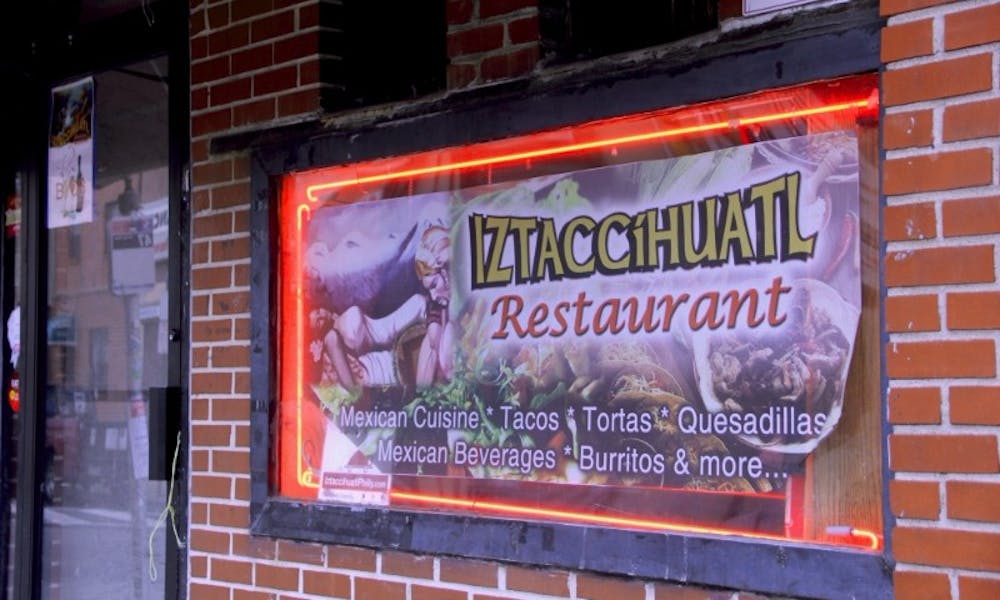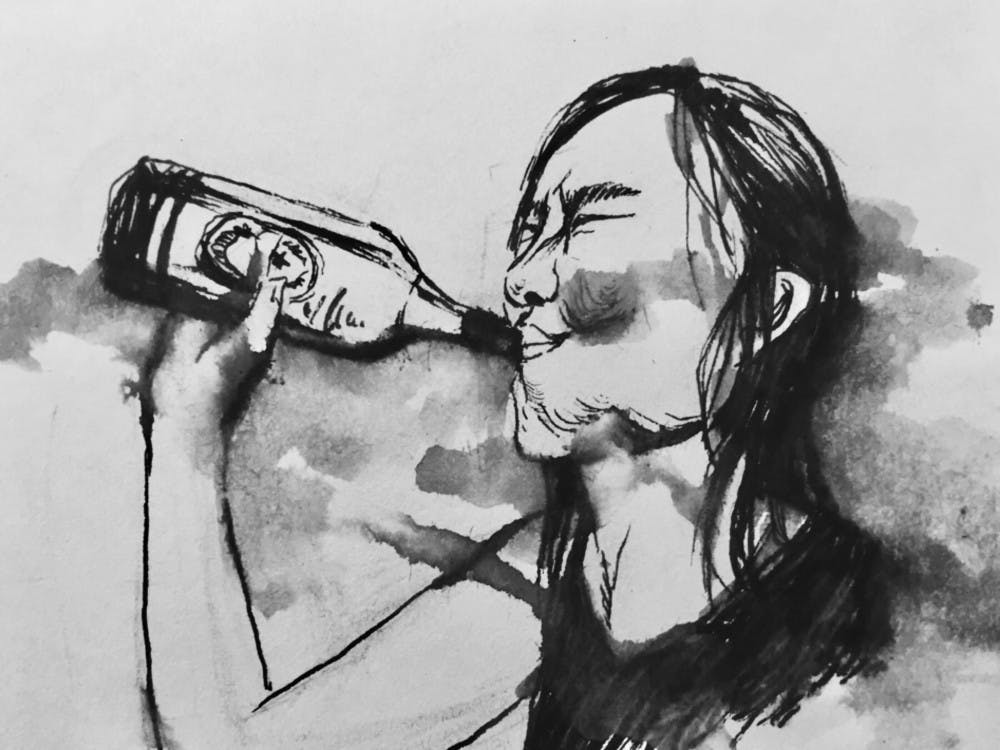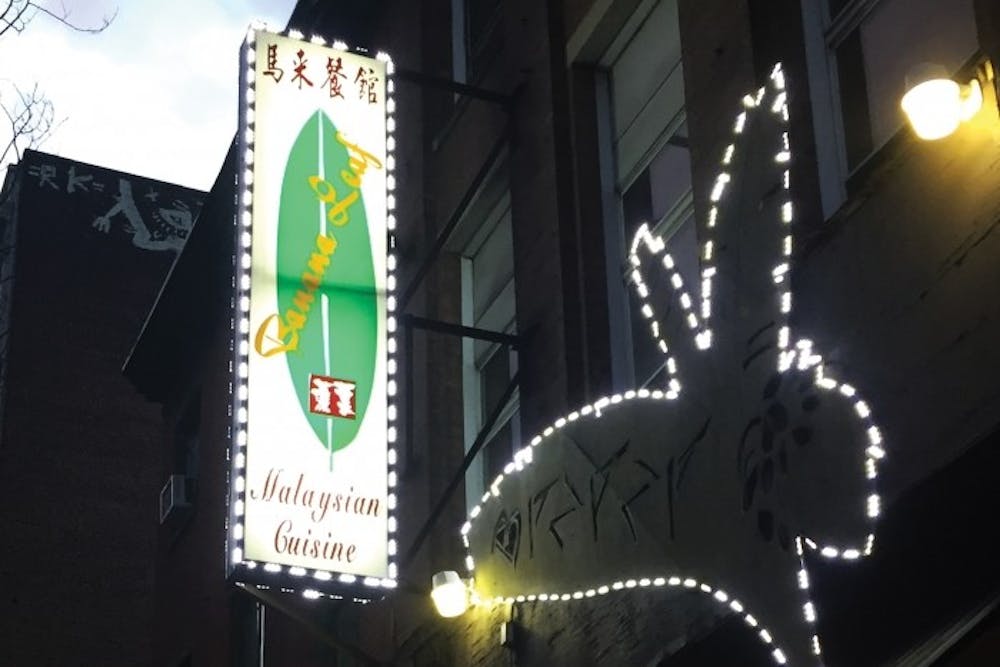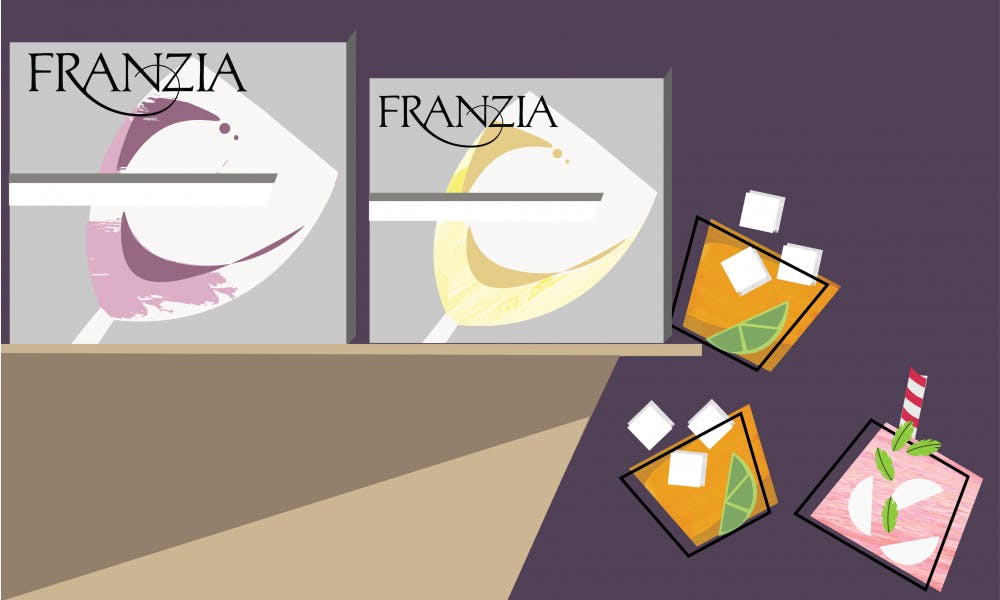The windows of Iztaccihuatl were blacked out. Customers who wanted to pick up food were instructed to call when they got there: don’t come in, we’ll bring it out to you. The Penn fraternity renting out the Mexican BYO restaurant for the night told manager John Lewis that apart from him, no one was allowed inside.
For an extra $500 on top of the $1,800–2,000 the frat shelled out to rent the place, John agreed—but, he said, he had to know why. The answer?
“They had like five strippers walking around naked in here,” John laughs.
As an extra caution, John pasted a sign on the door of the restaurant: “EXOTIC DANCERS INSIDE.”
“I had to do that just in case a girl came in, she may get offended,” he explains.
John has worked at Iztaccihuatl for five and a half years, more or less since it opened. Since then, he’s become a quasi–legendary figure in the world of Penn student BYO parties. John drinks with students; knows Greek organizations well enough to refer to them by their letters; and was offered to be an honorary member of four separate fraternities (he politely declined, saying he didn’t want to be biased towards one particular group). He even makes MERT jokes.
He says he has “a blast at the parties” that Penn students throw in his restaurant. He hands off the AUX cord, flicks on the strobe, sets up “shotgun stations” and beer pong tables, and joins in on the fun.
“If you remember anything, you didn't drink enough,” John announces. He elaborates on his role in the revelry, describing the “man shot” (“basically an eight ounce shot of tequila”), the tabletop dancing, the noise. It’s a little hard to imagine such debauchery, though, when you see Iztaccihuatl at 3:00 p.m. on a Tuesday.
The cavernous space is empty of customers, apart from a couple picking quietly at tortilla chips in the corner of the room. A soccer match rages on the television; a distant generator hums from the kitchen, whose doors sway half open. The owner’s daughter sits at the bar counter, playing on an iPad. At one of the many empty tables, John talks about the week he had to replace the toilet seats seven times because drunk Penn students kept breaking them.
“I don’t even care about the toilet seats at this point. But was really annoying to keep changing them every day,” he laughs. “It’s profitable, the party, so that’s no problem.”
Toilet seats aside, he has a particular soft spot for Penn students.
“I actually kind of love it because Penn students, when they want something, they’ll pay for it. If they break something, they pay for it,” he says. “Guess what. If you’re willing to pay for it, I’ll give you whatever you want.”
The BYO—Bring Your Own [Alcoholic Beverage]—is a signature characteristic of Philadelphia restaurants that arises out of a quirk in Pennsylvania state law. Many restaurants can’t afford expensive liquor licenses—which can cost as much as $500,000—but it remains perfectly legal for patrons to bring their own alcohol to restaurants. It’s ideal for smaller restaurants because they save a lot of money. It’s also ideal for college students, as oftentimes BYO restaurants will not check IDs, and many, like Banana Leaf, don’t have corkage fees either.

Iztaccihuatl's South Philly storefront
Although John welcomes the students that frequent Iztaccihuatl, he has had to adapt his business for them. In turn, he’s seen a change in the way other customers interact with the restaurant. Both John and Kevin B., a manager at Banana Leaf, a Malaysian BYO restaurant in Chinatown, note a shift in clientele on the weekends. Non–Penn patrons will avoid their restaurants on Thursday, Friday, and Saturday nights, the most popular times for Penn BYOs.
Kevin calls it a “vicious cycle.”
“Our student clientele makes up most of the weekend, but the reason why our regular clientele is so low is because they’re scared of the students,” he says.
John says business is particularly hurt in the summertime, when most Penn students are gone but Iztaccihuatl’s reputation as a raucous college hangout still remains. The money he makes from student BYOs, though, is enough to offset that loss. He says Penn BYOs have even helped advertise Iztaccihuatl’s potential as an event space—someone recently rented it out for a wedding. He’s certainly not worried.
“If I have a customer that doesn’t mind the loud music and drunk people running around, the dancing and shots, the college kids, they can sit down,” he says. “If they don’t like it I don’t care. They can get out.”
Kevin is a little more cautious. He says that Banana Leaf is now trying to limit BYO party sizes to a maximum of around 40 people.
“We’re strict, but at the same time we try not to be a buzzkill,” Kevin says.
Kevin says that while regular customers do complain about too–rowdy Penn students, most will still come to eat—just not on the weekends. He is only really bothered by objections from parents who say they won’t bring their children to Banana Leaf because the Penn BYO parties are a “bad influence.” When he hears these complaints, Kevin thinks of his own sister, who’s 20 years younger and still a child.
“I’m more of a parent to her than a big brother. I do take her here every once in a while for dinner and she sees the same thing and I’m like, I wish I could stop it, but at the same time that’s our clientele,” he says. “There’s only so much we can do to limit it.”

Though he only started working at Banana Leaf last fall, restaurant supervisor Hengky T. has become quickly accustomed to the rituals of Penn student BYO parties.
“The drunk students, they will throw up everywhere, and then they throw the food everywhere and they break the glasses and the plates,” Hengky says, quite placidly.
They throw up in the restaurant?
“Yes. But in their own territory,” Hengky clarifies. Vomit is not a dealbreaker, as long as it’s cordoned-off in the students’ zone, away from other patrons. Hengky adds that he’s never had to kick a Penn student out of the restaurant for being too drunk.
At Iztaccihuatl, vomit is not grounds for expulsion either. John only has one rule: clean it up yourself.
“I don’t pick up the throw up. The students do,” John declares. “Look, you’re not a five–year–old. I don’t care if you throw up. I’m not gonna kick you out if you throw up. I’m really not.”
He prefers an approach based on rehabilitation rather than punishment.
“If you were really drunk I’d rather you sit down at the table, take a breather real quick and get your head together, rather than just throw you out the door, you know,” he explains. “I don’t wanna MERT somebody.”
Even John, though, concedes that he’s had to call an ambulance for drunk students a couple times.
“You just kinda put ‘em in the corner, you watch ‘em, and the ambulance comes and you just put the blazer back on again,” he says. Perhaps recollecting a blackout student in need of sartorial assistance, he starts chuckling. “I’m dead serious.”
“Yeah. I’ve seen all that,” Jesse Liu (C '18) confirms.
Jesse transferred to Penn his sophomore year from Cornell, where BYO parties were not a staple. In the last two and a half years, he estimates that he’s attended “20 or 30,” and loves them.
“It’s fun and it’s a great way to save money,” he says.
Anjali Berdia (C '21) says she has “mixed feelings” about Penn’s BYO culture. Anjali thinks BYO culture is an added bonus to campus social life that other colleges might not have, and allows for a wider range of clubs to host social events.
“Like, Penn Dems isn’t going to have a frat party, you know?” Anjali says.
But Anjali admits that BYOs can also be “expensive." At Iztaccihuatl, it’s $20 per person just to get in the door—regardless of dietary or drinking restrictions. A Banana Leaf BYO will cost each person at least $18, and groups over 20 must opt for a set menu. These restrictions, put in place after the advent of student BYOs, are inflexible.
“Eat, don’t eat, mother died, religious holiday, I really don’t care,” says John. “You wanna come in past that little foyer, 20 dollars. ‘I just wanna go say hi for two minutes.’ Cost you 20 dollars.”
Alcohol adds a further cost, as does transportation, usually in the form of Uber rides. Banana Leaf and Iztaccihuatl do not have corkage fees, which Kevin says is becoming relatively rare among Philadelphia BYO restaurants.
These prices can be exclusionary for some Penn students. Malkia Okech (C '19) usually avoids BYOs because of the financial strain—the last one she attended was in the fall of her sophomore year. This semester, after joining a new club, she decided to join them for a BYO at Banana Leaf.
Flipping through the restaurant menu, she settled on a $7 soup. Then she found out about the cover fee. The group was small enough that they didn’t have to go with the set menu, but restaurant policy dictated they still had to order food worth a minimum of $18 per person.
“How am I going to spend eighteen dollars?” Malkia remembers asking the club’s finance chair. She was wondering how she’d be able to afford it.
“Oh, if you don’t think you can make the $18,” he said, “Just order two of the same dish.”
Malkia had no choice but to spend over double what she’d budgeted for the evening. On the way back to campus, she says, all she could think about was “How I was gonna get out of paying the guy for the Uber there.”
“I came into the BYO with an open mind, since I haven’t been to one in so long and hoped to meet some new people,” Malkia says. “But I left hopeless and reminded of why I avoided them in the first place. People who come from high–income homes live in a totally different world, one I can’t even understand or start to pretend to.”
To ensure that these BYOs are financially viable for the restaurants, they were forced to institute the flat fee to avoid losing money from student BYO parties. Kevin remembers how students would come in groups of 20, order maybe one appetizer between them, and drink.

The Banana Leaf bunny
Now any group over 20 people has to order the set menu, which costs a minimum of $18 per head. While it’s helped with business, Hengky notes that a different kind of waste can still abound.
“We get the food all ready, it’s like family style for them to eat, and then sometimes they bring beer or alcohol, so many are drunk already [and] they don’t eat the food too much,” he says.
During Kevin’s time at Banana Leaf, the restaurant has also started a new policy where reservations for over 30 people require down payments, after numerous no–shows.
“It actually happened last night, I think it was Penn—the reservation was for 60 people. We prepared for 60. Twenty came in,” Kevin says.
The no–shows mean firstly that there’s 60 people worth of food going to waste, and that the restaurant loses 60 potential customers who might have come to eat. Still, Kevin emphasizes, “We love you guys.”
“We’re trying to keep a balance,” Kevin says. “Our boss and our owner is very understanding—you’re in college, you wanna have fun. We understand that and we try to accommodate that as much as possible, but at the end of the day we’re a business as well, we need to keep things fair for us too.”
Naomi Elegant is a junior from Kuala Lumpur, Malaysia studying History. She is a Features Staff Writer for Street and a Graduate Student & Alumni Beat for the DP.

